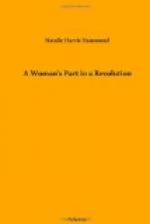Mr. Hammond took his place with the three leaders, attended by his physician, Dr. Scholtz, who remained at his side during the entire trial.
After some preliminary matters were disposed of, Mr. Hammond, actuated by the same influences that were brought to bear on his associates, entered a plea of guilty to count one of the indictment, and placed his signature to the written statement which had been previously signed by Messrs. Rhodes, Phillips, and Farrar.
This written paper was in substance as follows:—
That for a number of years the Uitlanders had earnestly and peacefully sought relief for their grievances by the constitutional right of petition. That what they asked was only what was conceded to new-comers by every other South African Government.
That petition after petition was placed before the authorities—one bearing 40,000 signatures, asking alleviation of their burdens and wrongs; that they could never obtain a hearing, and that the provisions of law already deemed obnoxious and unfair were being made more stringent; and, realising that they would never be accorded the rights they were entitled to receive, it was determined to make a demonstration of force in support of their just demands.
The statement then recites the coming of Jameson against their express commands and understanding with him, and all the subsequent acts of the Transvaal Government, the High Commissioner, and De Wet, Her Majesty’s Agent, which are now matters of history.
The paper concluded as follows:—
’We admit responsibility for the action taken by us. We practically avowed it at the time of the negotiations with the Government, when we were informed that the services of the High Commissioner had been accepted with a view to a peaceful settlement.
’We submit that we kept faith in every detail of the arrangement. We did all that was humanly possible to protect both the State and Dr. Jameson from the consequences of his action; that we have committed no breach of the law which was not known to the Government at the time; and that the earnest consideration of our grievances was promised.
’We can now only
put the bare facts before the Court, and
submit to the judgment
that may be passed upon us.’
After the examination of several witnesses and the introduction of the celebrated cipher telegrams, the Court was adjourned for the day.
TUESDAY, THE 28TH.—There was a vast concourse gathered at the Market Hall on this day of the trial. The chamber was crowded to its utmost limit by anxious and interested listeners. Many ladies were present.
His Lordship (the imported Judge) was late in ascending the bench, unnecessarily prolonging the suspense of the waiting crowd.
The proceedings were commenced with every formality that could render them impressive. A large number of armed men were stationed at the entrance and about the Court-room. A prominent object in the Court-room, one which immediately struck the eye of those entering, as this was its first appearance during the trial, was a plain wooden dock, low in front, high at the back, and large enough to hold four men.




